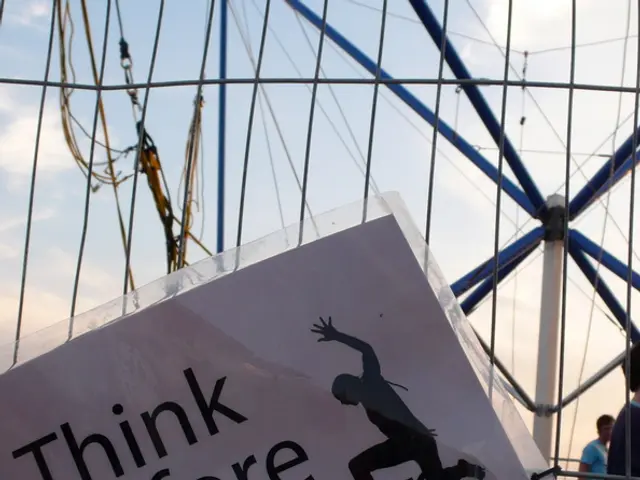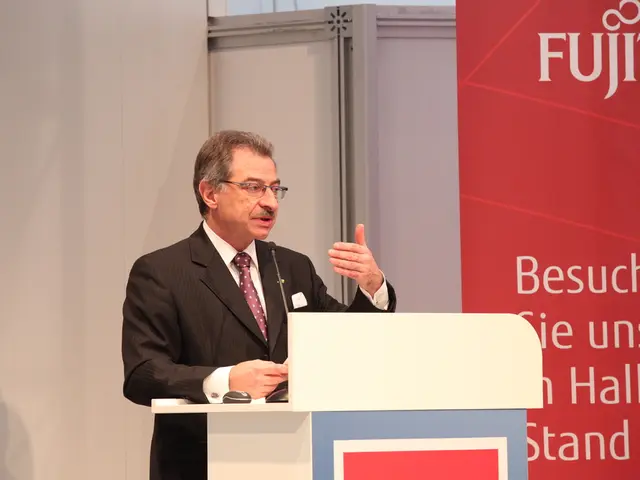Fresh Take: A Firestorm Over Farms and Genocide Allegations
U.S. to welcome South African leader for discussions next week, following the acceptance of white South African refugees by the United States.
In a whirlwind of controversy, President Donald Trump is set to meet with South African President Cyril Ramaphosa next week following a barrage of accusations and counter-claims about racial persecution and genocide in the African nation.
The face-to-face, scheduled for May 21, follows Trump's controversial stance on what he claims is a "genocide" taking place against white farmers in South Africa—an assertion denied by the South African government. The United States has acknowledged 59 white South Africans as refugees in the past week, signaling the start of a larger relocation initiative for minority Afrikaner farmers.
Ramaphosa's impending visit to the White House aims to mend relations between the two nations and forge a new strategy, according to his office.
The surge of allegations and counter-claims have generated controversy, not only in South Africa but also in the United States.
The Controversial Claims
Trump accusations of genocide in South Africa appear to center around the country's affirmative action laws intended to propel prospects for Black people and a recent land expropriation law granting the government power to seize private land without compensation. These measures have sparked alarm among some Afrikaner groups who fear their land may be taken and redistributed among the Black majority.
Meanwhile, South African authorities assert that the relatively small number of killings of white farmers should be condemned but are not isolated instances of racial persecution. Instead, they claim these deaths are part of the country's broader struggle with violent crime.
International Response and Tensions
The U.S. fury over South Africa's perceived racist, anti-white laws has prompted Trump to sever funding to the country, citing what he deems to be the government's anti-American foreign policy and anti-white policies at home. Trump's stance on South Africa mirrors his ongoing disapproval of Black-led governments and his support forWhite nationalist causes.
The U.S. criticisms of South Africa have alarmed international observers, who view it as an attempt to sow discord and exacerbate racial tensions. South African officials have criticized the U.S. for disseminating false information about the country's laws and the state of its farmers, denying any intentional persecution of whites.
Ahead of the much-anticipated meeting between Trump and Ramaphosa, it remains to be seen whether the African leader will address these tensions, clarify the situation for white farmers, and dispel allegations of genocide.
Notable Historical Context
The roots of the ongoing allegations can be traced back to South Africa's tumultuous history of apartheid, a system of racial segregation and oppression that lasted from 1948 to 1994. The enduring legacy of apartheid has cast a long shadow over modern South Africa, exacerbating racial tensions and creating politically charged narratives.
The Road Ahead
As the meeting between Trump and Ramaphosa looms, both leaders will need to navigate sensitive diplomatic waters and strike a balance between addressing the concerns of their respective constituents and fostering a positive, productive relationship between their countries. Whether the meeting serves to dampen the fires of controversy or fan the flames of international discord remains to be seen.
- The political controversy surrounding President Donald Trump's claim of genocide against white farmers in South Africa has extended to the general news, as the government of South Africa denies the allegations and views Trump's stance as an attempt to sow discord and exacerbate racial tensions.
- Seattle's politics have been affected by the international response to the South African general-news story, as some local politicians have spoken out against the Trump administration's characterization of South African policies as racist and anti-white.
- Crime remains a significant issue in both Seattle and South Africa, with both nations grappling with violent crime that has sparked concerns and affected the everyday lives of their citizens, separate from the ongoing political debates and allegations of genocide.








